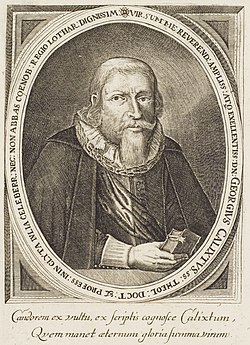In the 1600s there was a man named Georg Calixtus. He was a man who believed that Luther's interpretation of scripture was the best. This was his theological stream. But he was also uncomfortable with the rigid dogmatism and rigidity that was surrounding the Lutheran scholastic world at the time. Here is a little bit of what he thought.
"Everything that is in Scripture has been revealed by God, and ought to be believed; but not all is of equal importance. Only that which relates to salvation is fundamental and absolutely necessary. The rest is equally true, and is also important, for otherwise God would not have revealed it. But it is not essential for being a Christian. There is a difference between heresy and error. The former is the denial of something that is essential for salvation. The latter is a denial of another element of revelation. Both heresy and error are evil, and should be avoided. But only heresy is of such gravity as to keep Chrsitian from communion with each other... (There is more about how to tell what is essential for salvation and an example of Justification by Faith as something which is Biblical but not essential for salvation) Therefore, although it is important (Justification by Faith), it is not to be required by all, as if any who reject it were heretics. Luther was right in affirming this doctrine, and Lutherans are also right in insisting on its truth. But this does not mean that Catholics are heretics. And the same can be said regarding the differences between Lutherans and Calvinists on the manner of the presence of Christ in communion. Although Calvinists are in error, they are not heretics."
(Gonzalez, Justo L. The Story of Christianity Vol 2. NY: HarperCollins Publishers, 1985) p. 177-178
I like this idea. Though it does need to be said that originally Calixtus accused of being a syncretist (which doesn't really makes sense since that wasn't what he was doing but....) All of this is to say after my last post, I think that we need more people who are like Calixtus. Who are willing to have strong theological convictions, who believe that they are right, but also very concerned that Christians stay in communion with each other. Even Christians who really really disagree with each other (Like Luther and the Catholics)

2 comments:
I wonder if you'd ever be interested in pastoring an international church. When I was at the International Church of Prague, I was intrigued by how people from Reformed, Anglican, Mennonite... could all worship and work together. Their theologies of baptism were entirely different, but they chose to focus on the Christian essentials. The common denominators were the core of the Christian faith and their desire to worship in English. Other than that it was an incredibly diverse group. I'm sure it was a challenge to hold them all together at times, but I thought it would be an interesting ministry.
I don't know Mom, the problem would be I would have to move out of Canada :) and I really like living in there. I am sure that such a diverse groups would bring a huge range of issues with them. I think it would take some good conflict mediation skills to be a good pastor in that setting.
Post a Comment